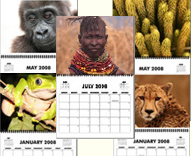
|
|
|
mongabay.com weekly newsletterThis newsletter is sent via email most Fridays. You can sign up for the newsletter here.Amazon soy becomes greener 07/25/2006 Brazilian soy crushers and exporters will implement a two-year moratorium on trading soybeans grown on newly deforested lands in the Amazon basin. The governance program takes effect in October 2006 and applies only to forest cleared after that date. New Chili Sauce Promotes Elephant Consevation 07/25/2006 First there was dolphin-safe tuna, then came fair-trade coffee. Now, hot sauce lovers can get into the act with a line of Elephant Pepper chili products that help protect elephants in southern Africa, and are available in the United States for the first time, according to the Wildlife Conservation Society (WCS). Northern Ireland mandantes green energy for new buildings 07/25/2006 The changes, which all apply to all new homes, company and public buildings, will make micro-generation, such as solar panels to heat hot water, solar photo voltaic panels on roofs to generate electricity or small wind turbines for houses, mandatory in under two years. Global Warming Threatens Australia's Tropical Biodiversity 07/25/2006 Global climate change will pose serious challenges for wildlife populations around the world in the coming decades. The findings of Dr. Stephen Williams (Centre for Tropical Biodiversity and Climate Change, James Cook University) suggest that endemic wildlife populations in Australia's Wet Tropics World Heritage Area will be particularly vulnerable to the local warming trend. Arguing climate change to an energy executive 07/25/2006 Earlier this month I had the opportunity to make a pitch to "Mike," a top executive of a major energy company, about climate change and green energy. Mike said he didn't believe humans are influencing climate or that green energy is a key factor in the future business of his firm, "EnergyCo." I tried to persuade him otherwise, not by focusing on the science of climate change but on economics and market opportunities. It's not that science isn't important--I just didn't want to get caught up in an argument about core beliefs, which is akin to arguing over religion. Elephants avoid hills 07/24/2006 Using global-positioning system data corresponding to the movements of elephants across the African savannah, researchers have found that elephants exhibit strong tendencies to avoid significantly sloped terrain, and that such land features likely represent a key influence on elephant movements and land use. On the basis of calculations of energy use associated with traversing sloped terrain by such large animals, the researchers found that this behavior is likely related to the fact that even minor hills represent a considerable energy barrier for elephants because of the added calorie consumption required for such movements. Invasive purple flower impacts Iceland's biodiversity 07/24/2006 A common sight throughout much of Iceland is large fields of vibrant purple nootka, or Alaskan lupine. The flower looks at home in this landscape, but was actually introduced in 1945 to lowland areas as a means to add nitrogen to the soil and also to function as an anchor for organic matter. Lupine has since flourished here, spreading like a wildfire, in almost effortless competition with the other species already in residence. Critics of this initiative view the flower as an invasive species that is threatening low-growing mosses and other native plants. Bees and flowers disappearing together 07/23/2006 The diversity of bees and of the flowers they pollinate, has declined significantly in Britain and the Netherlands over the last 25 years according to research led by the University of Leeds and published in Science this Friday (21 July 2006). The paper is the first evidence of a widespread decline in bee diversity. Brazil, U.S. renew Amazon research agreements 07/23/2006 Thursday Brazil and the U.S. renewed two Amazon forest research agreements. Brazilian Deputy Minister of Science and Technology Dr. Luis Manuel Rebelo Fernandes signed two continuation agreements for research on the Amazon: the Large-Scale Biosphere - Atmosphere Experiment in Amazonia (LBA) and Biological Determinants of Forest Fragments Program (BDFFP). Implementation of the programs will be lead by Brazil's INPA, or the Brazilian Institute for Research in the Amazon. Bicycle riders worse for the environment than car drivers? 07/23/2006 A new paper argues that bicycling may be more damaging to the environment than driving a car, but not for the reason you might think. Karl T. Ulrich, a professor at the Wharton School of the Business at the University of Pennsylvania, argues that there are environmental costs associated with increased longevity of those who engage in physical activity. Ulrich reasons that because cyclers live longer they will produce more carbon emissions over the course of their extended life. Tropical Asia needs to act to save biodiversity, say scientists 07/22/2006 A group of scientists urged governments of tropical Asia to take steps to stem biodiversity loss across the region. At the annual meeting for the Association for Tropical Biology and Conservation, hosted at the Tropical Botanical Garden (XTBG) of the Chinese Academy of Sciences in the Yunnan province of China, scientists said that population growth and booming economic expansion are fueling illegal logging, wildlife poaching, and habitat destruction. The scientists noted that populations of elephants, rhinoceroses, tigers, sun bears, orangutans, and other species unique to tropical Asia have fallen significantly in recent years as a result of these activities. NASA no longer seeks to 'understand and protect' Earth 07/22/2006 The New York Times reports that NASA no longer seeks to 'understand and protect' Earth according to its mission statement. The Times found that the American space agency modified its mission statement in early February 2006, deleting the phrase 'to understand and protect our home planet'. Venomous snakes key to human evolution says new theory 07/21/2006 The ability to spot venomous snakes may have played a major role in the evolution of monkeys, apes and humans, according to a new hypothesis by Lynne Isbell, professor of anthropology at UC Davis. The work is published in the July issue of the Journal of Human Evolution. Texas utility racing to build polluting coal-fired power plants 07/21/2006 The Wall Street Journal today reported that TXU, a Dallas-based utility, is building 11 power plants that use pulverized coal. The paper notes that pulverized coal 'releases substantial amounts of carbon dioxide, the most worrisome of several heat-trapping gases widely blamed for global warming.' The 11 new plants would more than double the company's carbon-dioxide emissions, from 55 million tons in 2004 to more 133 million tons in 2011. News index | RSS | News Feed Advertisements: Organic Apparel from Patagonia | Insect-repelling clothing |
MONGABAY.COM
WEEKLY NEWSLETTER
T-SHIRTS 
CALENDARS 
CANVAS BAGS 
|
|
Copyright mongabay 2009 |





